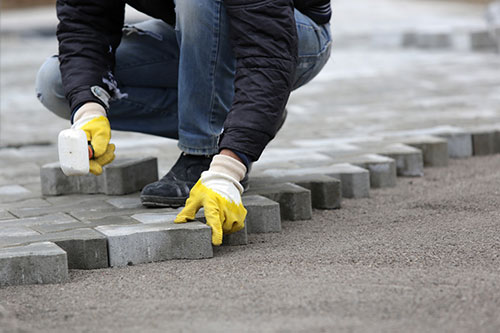Trying to decide between stamped concrete and interlocking concrete pavers for your driveway or patio? Before you settle on one choice, learn the pros and cons of each.
What Are They?
Pavers are multi-colored pieces of concrete, which are interlocked to form a durable surface for walkways, driveways and patios. On the other hand, stamped concrete is poured as a solid surface and then embossed or textured to resemble brick, flagstone, slate, stone, tile or even wood.
While stamped concrete is relatively new, pavers have been used for hundreds of years to make Spanish monastery courtyards, European village pathways and breathtaking hardscapes in homes across the globe. This gives pavers a time-tested reputation for exceptional durability. That said, pavers do have a few limitations that make stamped concrete a popular choice for homeowners who want especially complex or ornate design patterns.
At the same time, pavers and stamped concrete both have strengths and weaknesses that can be especially relevant, depending on where you live.
Stamped Concrete
Because of its distinctive textures and variations, stamped concrete offers more ornate design possibilities that give it a “wow” factor. In addition to this, there are several other benefits that make it appealing to homeowners, including:
- It offers a wide array of colors and patterns.
- Since concrete is so mobile, you can hand-blend colors on site.
- Stamped concrete can be sealed to provide extra protection against weather, auto leakage and swimming pool chemicals.
- With nearly limitless potential for customization, it can closely imitate segmented paving or natural stone.
Unfortunately, despite its many benefits, stamped concrete does come with relatively high initial costs, not to mention the time and money spent on maintenance and repairs. It also comes with a number of other drawbacks, including:
- Since do-it-yourselfers can struggle with installation, a professional installer is often required.
- Concrete is very prone to cracking, especially in climates that see a lot of freezing and thawing.
- Earthquakes and foundation issues will cause stamped concrete to crack.
- Because control joints and saw cuts are required to mitigate cracking, interruptions can occur across stamped pattern lines.
- De-icing salts can deteriorate ornate designs.
- Since colors can fade under the sun, it’s not always easy to find accurate matches when repairs require patching.
- Homeowners must reseal their stamped concrete at least once per year.
Interlocking Concrete Pavers
Unlike stamped concrete, pavers typically do not crack when they are properly installed. They also come with a number of other benefits that make them attractive to homeowners, including:
- Pavers cost about the same as stamped concrete in most instances.
- Since they usually do not require replacement, pavers offer better cost efficiency over time.
- Repairs are quick and seamless, requiring easy replacements of cracked or broken pavers.
- Colors and patterns can be mixed and matched to make stunning designs with accents, bandings and borders.
While it does have some clear advantages of stamped concrete, pavers aren’t perfect. Among the most notable drawbacks include:
- Unless a binding polymer is used, joint sands will need to be topped off every year or two.
- Weeds can sprout up between pavers unless a binding polymer is used to harden joint sands.
- Improper installation can cause pavers to move or settle over time, especially without proper soil preparation.
- Since lots can be slightly lighter or darker from pallet to pallet, installers need to carefully blend the pavers to keep them from appearing blotchy.
As you can see, there are advantages and disadvantages to both concrete pavers and stamped concrete. If you are concerned about maintenance, fading, repairs and climate-related cracking, pavers are probably your best bet. If, on the other hand, you value the “wow” factor above all else, stamped concrete may be the way to go.
2-10 HBW offers the most comprehensive Home Warranty coverage for homeowners. Let us help you protect your home.








